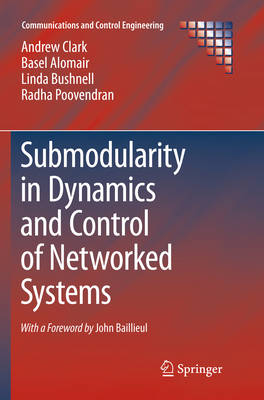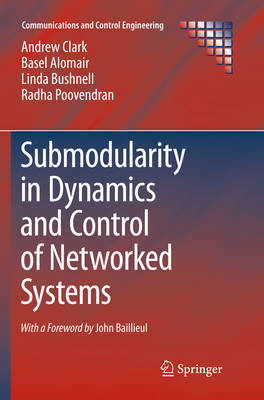
- Afhalen na 1 uur in een winkel met voorraad
- Gratis thuislevering in België vanaf € 30
- Ruim aanbod met 7 miljoen producten
- Afhalen na 1 uur in een winkel met voorraad
- Gratis thuislevering in België vanaf € 30
- Ruim aanbod met 7 miljoen producten
Submodularity in Dynamics and Control of Networked Systems
Andrew Clark, Basel Alomair, Linda Bushnell, Radha PoovendranOmschrijving
This book presents a framework for the control of networked systems utilizing submodular optimization techniques. The main focus is on selecting input nodes for the control of networked systems, an inherently discrete optimization problem with applications in power system stability, social influence dynamics, and the control of vehicle formations. The first part of the book is devoted to background information on submodular functions, matroids, and submodular optimization, and presents algorithms for distributed submodular optimization that are scalable to large networked systems.
In turn, the second part develops a unifying submodular optimization approach to controlling networked systems based on multiple performance and controllability criteria. Techniques are introduced for selecting input nodes to ensure smooth convergence, synchronization, and robustness to environmental and adversarial noise. Submodular optimization is the first unifying approach towards guaranteeing both performance and controllability with provable optimality bounds in static as well as time-varying networks. Throughout the text, the submodular framework is illustrated with the help of numerical examples and application-based case studies in biological, energy and vehicular systems.
The book effectively combines two areas of growing interest, and will be especially useful for researchers in control theory, applied mathematics, networking or machine learning with experience in submodular optimization but who are less familiar with the problems and tools available for networked systems (or vice versa). It will also benefit graduate students, offering consistent terminology and notation that greatly reduces the initial effort associated with beginning a course of study in a new area.
Specificaties
Betrokkenen
- Auteur(s):
- Uitgeverij:
Inhoud
- Aantal bladzijden:
- 210
- Taal:
- Engels
- Reeks:
Eigenschappen
- Productcode (EAN):
- 9783319800516
- Verschijningsdatum:
- 30/03/2018
- Uitvoering:
- Paperback
- Afmetingen:
- 155 mm x 10 mm
- Gewicht:
- 395 g

Alleen bij Standaard Boekhandel
Beoordelingen
We publiceren alleen reviews die voldoen aan de voorwaarden voor reviews. Bekijk onze voorwaarden voor reviews.









